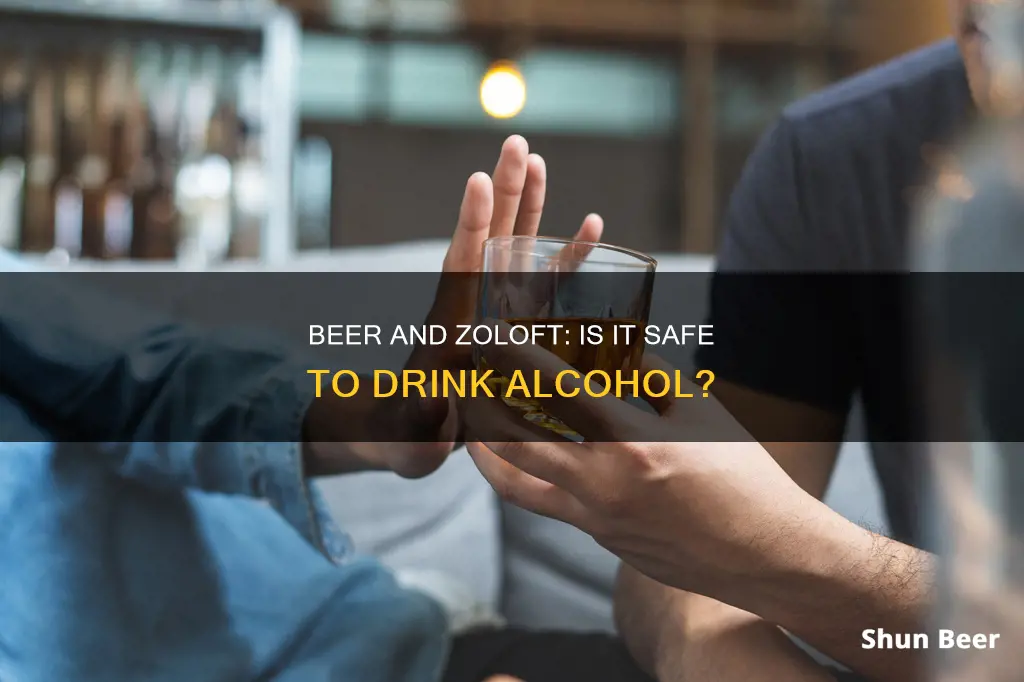
Zoloft, or sertraline, is a commonly prescribed antidepressant medication used to treat mental health conditions such as major depressive disorder, obsessive-compulsive disorder, and social anxiety disorder. It is part of a class of antidepressants called selective serotonin reuptake inhibitors (SSRIs), which work by increasing serotonin levels in the brain. While it may be tempting to unwind with a drink, mixing alcohol with Zoloft can lead to adverse side effects and even life-threatening situations.
Alcohol is a central nervous system depressant, slowing down activity in the brain and nervous system. When combined with Zoloft, it can cause an amplified response to alcohol, with one drink potentially feeling like two. This can lead to a range of negative consequences, including increased drowsiness, poor coordination, slurred speech, dizziness, and difficulty concentrating. More seriously, the combination can result in oversedation, with severe cases leading to slowed breathing, coma, and even death.
Additionally, alcohol can worsen the symptoms of depression and reduce the effectiveness of Zoloft, potentially leading to a downward spiral of increased alcohol consumption and worsening mental health. It is also important to note that skipping doses of Zoloft to accommodate alcohol consumption is not recommended, as it can lead to withdrawal symptoms and negatively impact the medication's effectiveness.
While some individuals taking Zoloft may not experience negative effects from consuming small amounts of alcohol, the general recommendation from healthcare professionals is to avoid the combination due to the potential risks involved. If you are taking Zoloft and considering drinking alcohol, it is crucial to consult your healthcare provider to weigh the unique risks and ensure your safety.
| Characteristics | Values |
|---|---|
| Should you drink alcohol while on Zoloft? | Generally not recommended by doctors, the U.S. Food and Drug Administration (FDA), and mental health professionals |
| Why? | Alcohol and Zoloft can cause similar side effects and dangerous interactions |
| Alcohol can worsen the symptoms of depression | |
| Alcohol can diminish the therapeutic effects of Zoloft | |
| Alcohol can cause unpleasant or potentially dangerous side effects when mixed with Zoloft | |
| Alcohol can increase the risk of overdose | |
| Alcohol can cause alcohol poisoning | |
| Alcohol can interact with other medications | |
| Alcohol and Zoloft can cause adverse drug interactions, increasing the risk of severe health complications | |
| Alcohol and Zoloft can cause serotonin syndrome | |
| Alcohol and Zoloft can increase the risk of suicide | |
| Alcohol and Zoloft can cause changes in how the brain works, leading to impaired judgment, difficulty concentrating, and memory loss | |
| Alcohol and Zoloft can lead to a coma and even death in extreme cases | |
| How long does Zoloft stay in the system? | Around five to six days, but may take longer for older people or those with liver issues |
What You'll Learn

Zoloft and alcohol are central nervous system depressants
The combination of Zoloft and alcohol can also increase the risk of serotonin syndrome, a potentially life-threatening condition caused by an overload of serotonin in the brain. Symptoms may include agitation, confusion, rapid heart rate, high blood pressure, and even seizures in severe cases.
Additionally, alcohol is a depressant and can worsen mood disorders, increasing the risk of suicidal thoughts or behaviours in individuals taking Zoloft. The combination can intensify feelings of hopelessness, impulsivity, and poor judgment, heightening the risk of self-harm.
Both alcohol and Zoloft can cause drowsiness and sedation. When combined, they may lead to extreme drowsiness, impaired motor skills, slow reaction times, and an increased risk of accidents, making activities like driving dangerous.
Mixing alcohol and Zoloft can also put additional strain on the liver, which processes both substances. This can increase the risk of liver damage or toxin buildup in the body, potentially leading to serious health complications over time.
It is important to note that the impact of mixing Zoloft and alcohol can vary among individuals. Factors such as the dosage of Zoloft, the amount and frequency of alcohol consumption, and individual differences in metabolism can all influence the severity of the interaction.
Drinking Beer on a Pier: What's the Legal Ruling?
You may want to see also

Zoloft and alcohol can cause drowsiness and dizziness
Zoloft, also known as sertraline, is a prescription drug and antidepressant medication that belongs to a class of selective serotonin reuptake inhibitors (SSRIs). It works by changing how the brain cells reabsorb serotonin, a neurotransmitter that stabilizes an individual's mood. By blocking the brain's serotonin receptors, Zoloft causes more serotonin molecules to circulate, improving functions like mood, emotions, and sleep.
Alcohol, on the other hand, is a central nervous system depressant that affects the brain and spinal cord, leading to feelings of drunkenness. It can cause drowsiness, poor coordination, and slurred speech. When combined with Zoloft, alcohol can intensify its common side effects, such as dizziness, sedation, and difficulty concentrating. This combination can lead to dangerous consequences, including accidents, injuries, and even life-threatening situations.
The United States Food and Drug Administration (FDA) recommends avoiding alcohol while taking Zoloft, even in small amounts. This is because both substances interact with the brain's receptors and can cause harmful interactions with serious side effects. Combining Zoloft and alcohol can lead to increased drowsiness and dizziness, impaired judgment, difficulty thinking and concentrating, and a higher risk of overdose and alcohol poisoning.
Additionally, alcohol can diminish the therapeutic effects of Zoloft, making it less effective in treating symptoms of depression and other mental health issues. It is crucial to seek medical advice from a healthcare provider before consuming alcohol while taking Zoloft. It is essential to follow the recommendations of your healthcare provider regarding alcohol consumption to ensure your safety and well-being.
Beer Drinking: Harmful Health Effects You Need to Know
You may want to see also

Zoloft and alcohol can lead to serotonin syndrome
Zoloft, or sertraline, is a commonly prescribed antidepressant medication used to treat mental health conditions such as major depressive disorder, panic disorder, PTSD, OCD, social anxiety disorder, and premenstrual dysphoric disorder. It belongs to a class of antidepressants called selective serotonin reuptake inhibitors (SSRIs), which work by blocking the brain's serotonin receptors and causing more serotonin molecules to circulate. Serotonin is a hormone that stabilizes an individual's mood, and increased levels of it can benefit brain functions like mood, emotions, and sleep.
While Zoloft can be effective in treating these conditions, it is important to be aware of the potential risks and side effects associated with its use. One important consideration is the interaction between Zoloft and alcohol. Alcohol consumption while taking Zoloft can lead to serious health risks, including the development of serotonin syndrome.
Serotonin syndrome is a potentially life-threatening condition that occurs when there is too much serotonin in the body. Since both Zoloft and alcohol increase serotonin levels, consuming them together can push an individual into serotonin syndrome. The syndrome is characterized by a rapid heart rate, coma, and hallucinations. Additionally, the initial symptoms of serotonin syndrome, such as nausea, headache, and vomiting, can be similar to those of alcohol consumption, making it difficult to recognize that something is wrong.
The combination of Zoloft and alcohol can also lead to other dangerous side effects. Both substances are central nervous system depressants, which means they slow down or suppress brain activity. When combined, they can cause oversedation, slowed breathing, coma, and even death. Additionally, alcohol can reduce the effectiveness of Zoloft, bringing back the symptoms the medication is intended to treat.
Furthermore, people taking Zoloft may be at an increased risk of developing an addiction to alcohol. This is because individuals with mental health disorders are already at an elevated risk of developing addictions, and alcohol can seem like a temporary relief from their symptoms. However, alcohol makes mental health problems worse over time, not better.
In conclusion, while Zoloft can be a helpful medication for many individuals, it is crucial to avoid consuming alcohol while taking this drug due to the serious health risks associated with their interaction, including the potential development of serotonin syndrome. Always consult with a healthcare professional for personalized advice and to discuss any concerns about medication side effects.
Drinking Beer in Front of Cops: Is it Legal?
You may want to see also

Zoloft and alcohol can increase the risk of suicide
Zoloft, also known as sertraline, is a prescription drug and antidepressant medication that belongs to a class of selective serotonin reuptake inhibitors (SSRIs). It works by changing how the brain cells reabsorb serotonin, a hormone that stabilizes an individual's mood, and increased levels of which can benefit brain functions like mood, emotions, and sleep.
While Zoloft is used to treat mental health conditions such as major depressive disorder, social anxiety disorder, and obsessive-compulsive disorder, mixing it with alcohol is not recommended. This is because alcohol is a central nervous system depressant that affects the brain and interferes with its receptors, suppressing neurological signals and altering the way a person thinks and reasons.
The combination of Zoloft and alcohol can lead to dangerous consequences as it can intensify the common side effects of Zoloft, such as dizziness, sedation, difficulty concentrating, drowsiness, reduced alertness, and uncoordinated movements. Additionally, both substances can cause similar side effects, including increased serotonin levels, which may result in serotonin syndrome, a potentially life-threatening condition.
The mixture of Zoloft and alcohol can also increase the risk of suicidal thoughts and behavior. While Zoloft may increase suicidal behavior and thinking as a possible side effect, alcohol consumption can further heighten this risk. The interaction between the two substances can cause depression, hindering the effectiveness of the antidepressant and making a suicide attempt more likely.
Furthermore, a 2014 study showed that combining Zoloft and alcohol increased memory impairment, impulsivity, and violence in some individuals. It is important to note that each person metabolizes alcohol and antidepressants differently, and a safe amount of alcohol for one person may not be safe for another. Therefore, it is generally advised to avoid alcohol consumption while taking Zoloft to prevent harmful interactions and serious side effects.
Beer and Clonazepam: Safe Mix or Health Risk?
You may want to see also

Zoloft and alcohol can cause liver damage
Zoloft, or sertraline, is a selective serotonin reuptake inhibitor (SSRI) commonly used to treat mental health conditions such as major depressive disorder, social anxiety disorder, and obsessive-compulsive disorder. It works by blocking the brain's serotonin receptors, causing more serotonin molecules to circulate and improve mood, sleep, and emotions.
While Zoloft is a safe and effective medication for many people, it is important to be aware of potential risks and side effects when taking it. One of the most important things to know about Zoloft is that it should not be combined with alcohol. Here's why Zoloft and alcohol can cause liver damage and other serious issues:
Increased Risk of Liver Damage
When Zoloft and alcohol are mixed, there is a potential risk of liver damage. Alcohol is metabolized by the liver, and excessive alcohol consumption can lead to liver toxicity. Zoloft is also partially metabolized by the liver, and in rare cases, it has been linked to acute liver injury. Combining the two can increase the risk of liver damage, especially if consumed in large amounts or over an extended period.
Excess Serotonin and Serotonin Syndrome
Both alcohol and Zoloft can increase serotonin levels in the brain. While serotonin is often referred to as the "feel-good" hormone and can improve mood, excessive serotonin can lead to serotonin syndrome. Serotonin syndrome is a potentially life-threatening condition characterized by rapid heart rate, coma, and hallucinations. It is crucial to avoid anything that may increase the risk of this dangerous condition.
Impaired Judgment and Increased Risk of Accidents
Alcohol is a central nervous system depressant, and so is Zoloft. When combined, they can cause oversedation, leading to slowed reaction times, impaired coordination, and reduced alertness. This can increase the risk of accidents, falls, and injuries. Additionally, alcohol impairs judgment, which can be dangerous for individuals experiencing suicidal thoughts, a potential side effect of Zoloft.
Worsening of Side Effects
Mixing alcohol with Zoloft can worsen the side effects of the medication, including dizziness, drowsiness, and difficulty concentrating. These side effects can be dangerous, especially when performing tasks that require concentration and coordination, such as driving or operating heavy machinery.
Interference with Antidepressant Effectiveness
Alcohol can interfere with the effectiveness of Zoloft and other antidepressants. It can worsen symptoms of depression and make it more challenging for the medication to work as intended. This can lead to a downward spiral of increased alcohol consumption and worsening depression.
Unknown Effects of Combining Substances
There is limited research on the effects of combining Zoloft and alcohol, especially regarding small or occasional servings of alcohol. The specific effects can vary from person to person, as everyone metabolizes alcohol and antidepressants differently. Therefore, it is challenging for doctors to estimate safe amounts of alcohol consumption while taking Zoloft.
In conclusion, it is essential to avoid mixing Zoloft and alcohol due to the potential risks and side effects. If you are taking Zoloft, it is best to abstain from alcohol entirely. Always consult your healthcare provider for personalized advice and recommendations regarding your medication and alcohol consumption.
Morning Beer: Should You Drink Before Work?
You may want to see also
Frequently asked questions
It is generally not recommended to consume alcohol while taking Zoloft. Combining alcohol with Zoloft can lead to adverse side effects and dangerous interactions.
Drinking alcohol while on Zoloft can cause various side effects, including increased drowsiness and fatigue, decreased effectiveness of the medication, increased risk of overdose, alcohol poisoning, and interactions with other medications.
Yes, some warning signs of an alcohol and Zoloft interaction include respiratory distress, intense sedation, heart palpitations, constant headaches, changes in behavior or mental status, and suicidal thoughts and behaviors. If you experience any of these symptoms, seek medical attention immediately.







